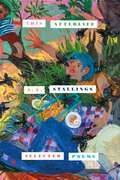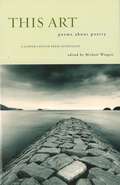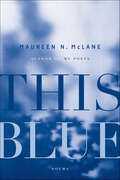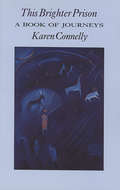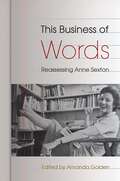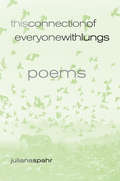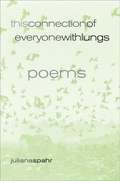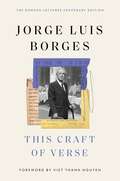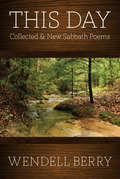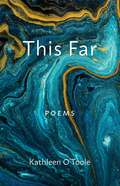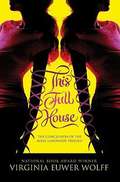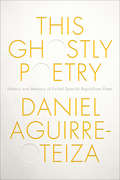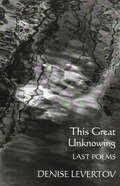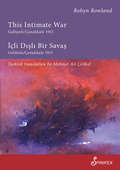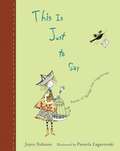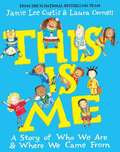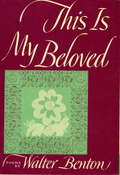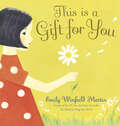- Table View
- List View
Thirukailaya Gyana Ula
by Seraman Perumal NayanarThis work is part of the 11th Thirumurai.'Ula' is one of the 96 types of 'Sitrillakiyam'. Also called 'Adhi Ula' as it is the first in the Ula genre.It talks in praise of Lord Shiva and how women of all ages are mesmerized by his charisma.
Thirukkural-Moolamum Angila Tamil Uraiyum
by ThiruvalluvarThirukkural by Thiruvalluvar is a collection of 1330 Tamil couplets organised into 133 chapters. The 133 chapters are grouped into three sections: Aram, porul ,inbam. Aram contains 380 verses, Porul with 700 and Inbam with 250 kurals. Each chapter has a specific subject. Thirukkural preaches simplicity and truth throughout its verses and has been translated to more than 35 languages across the world. This book has got meanings both in Tamil and English languages.
Thirukural
by ThiruvalluvarOrganized into three sections Thirukural is the one most ancients texts in Tamil that focuses on ethics. Known popularly as Ullaga Podhu Marai, Thirukural is made up of the three sections, viz, Arattu Paal, Porutpaal and Kaamattupaal
Thiruppavai
by AndalPart of Naalayira thivvya prabantham, Thriuppavai is a collection of 30 songs sung by Andal in praise of the Lord Mahavishnu. These songs are sung typically in the Tamil month of marghazhi culminating in the pongal festival in the month of Thai. It is said that Andal merged one with God at the end of these thirty days.
This Afterlife: Selected Poems
by A. E. StallingsA selection of sharp, witty, and impeccably crafted poems from A. E. Stallings, the award-winning poet and translator.This Afterlife: Selected Poems brings together poetry from A. E. Stallings’s four acclaimed collections, Archaic Smile, Hapax, Olives, and Like, as well as a lagniappe of outlier poems. Over time, themes and characters reappear, speaking to one another across years and experience, creating a complex music of harmony, dissonance, and counterpoint. The Underworld and the Afterlife, ancient history and the archaeology of the here and now, all slant rhyme with one another. Many of these poems unfold in the mytho-domestic sphere, through the eyes of Penelope or Pandora, Alice in Wonderland or the poet herself. Fulfilling the promise of the energy and sprezzatura of Stallings’s earliest collection, her later technical accomplishments rise to meet the richness of lived experience: of marriage and motherhood, of a life lived in another language and country, of aging and mortality. Her chosen home of Greece adds layers of urgency to her fascination with Greek mythology; living in an epicenter of contemporary crises means current events and ancient history are always rubbing shoulders in her poems.Expert at traditional received forms, Stallings is also a poet of restless experiment, in cat’s-cradle rhyme schemes, nonce stanzas, supple free verse, thematic variation, and metaphysical conceits. The pleasure of these poems, fierce and witty, melancholy and wise, lies in a timeless precision that will outlast the fickleness of fashion.
This Ancient Lyre: Selected Poems
by O. N. V. Kurup A. J. ThomasPoems edited by A. J. Thomas and translated from Malayalam by S. Velayudhan, et al.
This Art
by Michael WiegersThe centuries have changed little in this art, The subjects are still the same.--Kenneth RexrothWhy poetry? What is poetry and why do people write it and read it? Why, as Dana Levin has written, "this urge to making a scrapbook of stars"?Every poet, by accident or design, has responded to "Why poetry" by writing a poem about poetry (an ars poetica). Whether these poems focus on the personal, political, or philosophical, each recognizes that our world is more complicated than a direct statement.As Marvin Bell has written, "Writing is all and everything." This anthology of poems about the art and life of poetry--which draws widely from Copper Canyon's 30-year backlist of poetry books--proves him right.Poets write out of love and longing:Lord, let me live / long enough to dare /a love poem --Cyrus CassellsPoets confront suffering:since we will always have a suffering world, we must also always have a song.--David BudbillAnd poets write in order to live fully: We all stumble into ourselves /like this, fitting our fingers to the shape of letters,/ while the page gallops out of our reach--Rebecca SeiferleOnly poetry lasts.--Ho Xuan HuongMichael Wiegers is the Managing Editor at Copper Canyon Press.CONTRIBUTORS Included: [box] Kay Boyle, Olga Broumas, Hayden Carruth, Norman Dubie, Han Shan, Jim Harrison, Carolyn Kizer, W.S. Merwin, Jane Miller, Kenneth Rexroth, Ruth Stone, Anna Swir
This Blue: Poems
by Maureen N. McLaneNational Book Award FinalistA vital, exhilarating new collection of poems from the National Book Critics Circle nominee From lichens to malls to merchant republics, it's "another day in this here cosmos," in Maureen N. McLane's stunning third poetry collection, This Blue. Here are songs for and of a new century, poems both archaic and wholly now. In the middle of life, stationed in our common "Terran Life," the poet conjures urban pigeons, Adirondack mountains, Genoa, Andalucía, Belfast, Parma; here is a world sounded out, broken, possibly shareable, newly named: "Take it up Old Adam— / everyday the world exists / to be named." This Blue is a searching and a singing—intricate, sexy, smart.
This Brighter Prison: A Book of Journeys
by Karen ConnellyIn her first book of poetry since The Small Words in My Body, which won the Pat Lowther Prize for 1990, Karen Connelly writes, in the tradition of the writer-adventurer, of vivid encounters and reflections abroad and at home, continuing her pursuit of "living knowledge of the world." These poems enact journeys of the body and heart with candour and sensuous grace, catching the very texture of human experience in the lithe, muscular lines which have a cat-like metaphorical reach.
This Business of Words: Reassessing Anne Sexton
by Amanda GoldenOne of America's most influential women writers, Anne Sexton has long been overshadowed by fellow confessional poets Sylvia Plath and Robert Lowell and is seldom featured in literary criticism. This volume reassesses Sexton and her poetry for the first time in two decades and offers directions for future Sexton scholarship. Mapping Sexton’s influence on twenty-first-century cultural contexts, these essays emphasize her continuing vitality. Contributors: Jeanne Marie Beaumont | Jeffery Conway | Jo Gill | Amanda Golden | Christopher Grobe | Anita Helle | Kamran Javadizadeh | Dorothea Lasky | Kathleen Ossip | David Trinidad | Victoria Van Hyning
This Connection of Everyone with Lungs
by Juliana SpahrPart planetary love poem, part 24/7 news flash, the hypnotic poems of This Connection of Everyone with Lungs wrap with equal, angular grace around lovers and battleships. These poems hear the tracer fire in a bird's song and capture cell division and troop deployments in the same expansive thought. They move through concentric levels of association and embrace --from the space between the hands to the mesosphere and back again--touching everything in between. The book's focus shifts between local and global, public and private, individual and social. Everything gets in: through all five senses, through windows, between your sheets, under your skin.
This Connection of Everyone with Lungs: Poems
by Juliana SpahrThis Connection of Everyone with Lungs wrap with equal, angular grace around lovers and battleships. These poems hear the tracer fire in a bird's song and capture cell division and troop deployments in the same expansive thought.
This Craft of Verse (The Charles Eliot Norton Lectures)
by Jorge Luis Borges“A wondrously limpid testament to the pleasures of reading.” —Steven Poole, The GuardianSix incandescent lectures on literature from the patron saint of mirrors, metafiction, and infinite libraries.For more than thirty years, Jorge Luis Borges’s Norton Lectures went unpublished. Recorded at Harvard in 1967 and 1968, the tapes gathered dust in a library vault until their discovery after his death. It was a twist that the author of Labyrinths would have relished. This volume assembles the recovered materials, offering a priceless window into the Argentinian master’s lifelong love affair with the English language.This Craft of Verse captures the cadences, candor, wit, and erudition of one of the twentieth century’s enduring literary voices. Though his avowed topic is poetry, Borges explores subjects ranging from prose forms—especially the novel—to literary history, translation theory, and philosophical aspects of communication writ large. Borges here draws on a wide range of literary examples—modern and medieval English, Spanish, French, Italian, German, Greek, Latin, Arabic, Hebrew, and Chinese. He brings characteristic eloquence and inexhaustible enthusiasm to readings of Plato, the Old Norse kenningar, Byron, Poe, Chesterton, Joyce, and Frost, as well as translations of Homer, the Bible, and the Rubáiyát of Omar Khayyám.Whether discussing metaphor, the origins of verse, or his own “poetic creed,” Borges gives a performance as entertaining as it is intellectually engaging. A lesson in the love of literature and the making of a unique artistic sensibility, This Craft of Verse is a sustained encounter with one of the writers whose place in the twentieth century will be forever remembered.
This Day: Collected & New Sabbath Poems
by Wendell BerryFor nearly thirty-five years, Wendell Berry has been at work on a series of poems occasioned by his solitary Sunday walks around his farm in Kentucky. From riverfront and meadows, to grass fields and woodlots, every inch of this hillside farm lives in these poems, as do the poet's constant companions in memory and occasion, family and animals, who have with Berry created his Home Place with love and gratitude.There are poems of spiritual longing and political extremity, memorials and celebrations, elegies and lyrics that include some of the most beautiful domestic poems in American literature, alongside the occasional rants of the Mad Farmer, pushed to the edge yet again by his compatriots and elected officials.With the publication of this new complete edition, it is becoming increasingly clear that The Sabbath Poems have become the very heart of Berry's entire work. And these magnificent poems, taken as a whole, have become one of the greatest contributions ever made to American poetry.
This Far: Poems (Paraclete Poetry)
by Kathleen O'TooleThis collection offers a rich harvest taken from one season in the poet's creative life. Like movements in a musical composition, these poems share leitmotifs ? grief and the desire to honor those "saints" who have passed on; the sacramental power of nature; and, how works of art illuminate and console as they do. They point to the tension between the practice of monastic silence and the urge to bear witness, interrogating faith in the light of crises facing the earth and our human community. At the same time, the poet celebrates encounters that offer blessings of hope, inviting us to join her in a pilgrimage that leads us, with her, "this far," and gestures to what lies beyond.
This Full House
by Virginia Euwer WolffHigh-school-senior LaVaughn's perceptions and expectations of her life begin to change as she learns about the many unexpected connections between the people she loves best.
This Ghostly Poetry: Reading Spanish Republican Exiles between Literary History and Poetic Memory (Toronto Iberic)
by Daniel Aguirre-OteziaThe Spanish Civil War was idealized as a poet’s war. The thousands of poems written about the conflict are memorable evidence of poetry’s high cultural and political value in those historical conditions. After Franco’s victory and the repression that followed, numerous Republican exiles relied on the symbolic agency of poetry to uphold a sense of national identity. Exilic poems are often read as claim-making narratives that fit national literary history. This Ghostly Poetry critiques this conventional understanding of literary history by arguing that exilic poems invite readers to seek continuity with a traumatic past just as they prevent their narrative articulation. The book uses the figure of the ghost to address temporal challenges to historical continuity brought about by memory, tracing the discordant, disruptive ways in which memory is interwoven with history in poems written in exile. Taking a novel approach to cultural memory, This Ghostly Poetry engages with literature, history, and politics while exploring issues of voice, time, representation, and disciplinarity.
This Great Unknowing: Last Poems
by Denise LevertovWhen Denise Levertov died on December 20, 1997, she left behind forty finished poems, which now form her last collection, This Great Unknowing. Few poets have possessed so great a gift or so great a body of work--when she died at 74, she had been a published poet for more than half a century. The poems themselves shine with the artistry of a writer at the height of her powers.
This Intimate War Gallipoli/Canakkale 1915: Icli Disli Bir Savas: Gelibolu/Canakkale 1915
by Mehmet Ali Celikel Robyn Rowland"Very few collections bring home so powerfully the vulnerability of individuals in the face of history," writes Lisa Gorton of Robyn Rowland's powerful poems recording the experiences of soldiers, nurses and doctors, women munitions workers, wives, mothers, composers, painters and poets during the Gallipolli War,1915. It began with the Battle of Çanakkale and the defeat of the British navy. The land battle was hand-to-hand killing, the physical closeness of its soldiers unmasking the depersonalization of the propaganda of war. Importantly, the book finishes with a poem on women's friendship 100 years after the war, and the healing nature of love.
This Is Just to Say: Poems of Apology and Forgiveness
by Joyce SidmanWhen Mrs. Merz asks her sixth grade class to write poems of apology, they end up liking their poems so much that they decide to put them together into a book. Not only that, but they get the people to whom they apologized to write poems back. In haiku, pantoums, two-part poems, snippets, and rhymes, Mrs. Merz's class writes of crushes, overbearing parents, loving and losing pets, and more. Some poets are deeply sorry; some not at all. Some are forgiven; some are not. In each pair of poems a relationship, a connection, is revealed.
This Is Me: A Story of Who We Are and Where We Came From
by Jamie Lee Curtis Laura Cornell<p>From the #1 New York Times bestselling creative team of Jamie Lee Curtis and Laura Cornell comes a timely picture book about immigration. Raising important identity issues like “Where did we come from?” and “Who are we?” This Is Me is as delightful as it is important, sure to stimulate dinner table conversation. <p>In This Is Me a teacher tells her class about her great-grandmother’s dislocating journey from home to a new country with nothing but a small suitcase to bring along. And she asks: What would you pack? What are the things you love best? What says “This is me!” With its lively, rhyming language and endearing illustrations, it’s a book to read again and again, imagining the lives of the different characters, finding new details in the art, thinking about what it would be like to move someplace completely different. </p>
This Is My Beloved
by Walter BentonBorn in Austria of Russian parents, Walter Benton lived most of his life in the United States. After working on a farm, in a steel mill, as a window washer, as a salesman, and at various other jobs, he entered Ohio University in 1931, and in due course was graduated. He then spent five years as a social investigator in New York. During the second World War he served in the United States Army, being commissioned a lieutenant of the Signal Corps in the autumn of 1942 and later being promoted to a captaincy. After the war he returned to New York and devoted his time to writing.This Is My Beloved, the remarkable diary in verse that has become one of the most popular books of poetry, was his first published volume, though his work was already familiar to readers of Poetry, Fantasy, the Yale Review, and the New Republic. Never a Greater Need, a second selection of his poems, was issued in 1948. Walter Benton died in 1976.From the Hardcover edition.
This Is Our Earth
by Laura Lee Benson John CarrozzaAn inspirational and enlightening look at our earth! Laura Lee Benson's lilting verse carries us over panoramic landscapes as we visit the many creatures and natural wonders of the earth. The subtext introduces basic facts about our diverse environment and encourages global awareness and conservation. John Carrozza's spectacular watercolor illustrations play harmoniously with the spirit of the text. At the end, the verse is set to music so all can sing along!
This Is Our Earth
by Laura Lee BensonThis is our Earth to cherish and love, To clean and protect, to take care of, From the mountains so high with their rugged terrain, To the valleys below and the green grassy plain, This is our Earth.
This Is a Gift for You
by Emily Winfield MartinA stunning companion to the best-selling and beloved The Wonderful Things You Will Be, this picture book celebrates how we say "I love you" with gifts as heartfelt as a daisy, as magical as a dream, and as comforting as a place to belong. It is a poetic tribute to the simple joys of life and nature, and a reminder that the greatest gift we have is time spent together.The gift of quietand the gift of loud,your hand in my hand out in a crowd.New York Times bestselling author Emily Winfield Martin joyously and thoughtfully shares the different ways of giving and loving. Like a beautifully wrapped gift, life's every day moments are precious: in both the little things and the big things, we can all find wonder. From a feather, to a hug, to a sunset, this book captures these gifts within its pages to remind readers how much they are loved, and how incredible this world we share is. A meaningful gift for any occasion or holiday, and a stand-out for birthdays, graduations and other milestones, with its loving and inspiring message: "But this is a gift, here, just you and me." This Is a Gift for You is perfect for little ones (and those who read to them!) who love The Wonderful Things You Will Be and are looking for more magic, inspiration, and unconditional love from the pen and paintbrush of Emily Winfield Martin.

